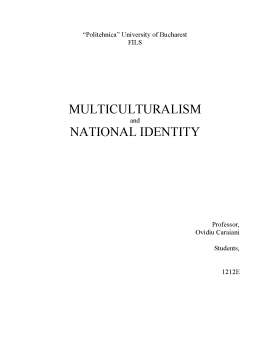Extras din curs
1. Multiculturalism
Definition:
Multiculturalism is the acceptance or promotion of multiple ethnic cultures, applied to the demographic make-up of a specific place, usually at the organizational level, e.g. schools, businesses, neighborhoods, cities or nations. In this context, multiculturalists advocate extending equitable status to distinct ethnic and religious groups without promoting any specific ethnic, religious, and/or cultural community values as central.
The policy of multiculturalism is often contrasted with the concepts assimilationism and social integration.
• Support for multiculturalism
Multiculturalism is seen by its supporters as a fairer system that allows people to truly express who they are within a society, that is more tolerant and that adapts better to social issues. They argue that culture is not one definable thing based on one race or religion, but rather the result of multiple factors that change as the world changes.
• Opposition to multiculturalism
When criticizing multiculturalism, it is important to first define the term. Andrew Heywood distinguishes between two overall forms of multiculturalism: descriptive and normative. "The term ‘multiculturalism’ has been used in a variety of ways, both descriptive and normative. As a descriptive term, it has been taken to refer to cultural diversity … As a normative term, multiculturalism implies a positive endorsement, even celebration, of communal diversity, typically based on either the right of different groups to respect and recognition, or to the alleged benefits to the larger society of moral and cultural diversity”.
Nation states that, in the case of many European nations, would previously have been synonymous with a distinctive cultural identity of their own, lose out to enforced multiculturalism and that this ultimately erodes the host nations distinct culture.
Other critics argue that multiculturalism leads directly to restrictions in the rights and freedoms for certain groups and that as such, it is bad for democracy, undemocratic and against universal human rights.
The anti-thesis of multiculturalism is moral, religious, and cultural solidarity among the people of a nation. Belief in one's self and the ultimate good of his people. A cohesiveness that produces a national vision, with set boundaries of acceptability and unacceptability in the affairs of a nation, while allowing for the natural differences in men. Multiculturalism as a tool of warfare becomes impotent and rejected in such an environment.
• Can Multiculturalism Reduce Prejudice?
The term “multiculturalism” has recently come into usage to describe a society characterized by a diversity of cultures. Religion, language, customs, traditions, and values are some of the components of a culture, but more importantly culture is the lens through which one perceives and interprets the world.
In the past several years there has been a growing trend towards multiculturalism in many areas of our society. Most of these trends are found on college and university campuses. we think this is likely due to a belief that the traditional Christian American values and views are unable to deal with the growing numbers of various ethnic minorities in our society. Although this trend would seem able to change society for the better,we believe that it has been and will be largely ineffective. It does, however, have some possible advantage over society's traditional view.
The Contact Hypothesis states that “increasing contact between groups can in some circumstances decrease prejudice between them.” It is possible that education about various cultural groups alone, could reduce prejudice similarly to actual contact; by increasing recognition of similarities, providing information that goes against the stereotypical grain, and breaking down the illusion of out-group homogeneity. It would likely do so less than contact.
Multiculturalism might be able to reduce prejudice without building the resentment among different nationalities.
2. Globalization
Multiculturalism also rises the problem of globalization, the name of a process of increasing the connectivity and interdependence of the world's markets and businesses. This process has speeded up dramatically in the last two decades as technological advances make it easier for people to travel, communicate, and do business internationally.
Globalization, or the increased interconnectedness and interdependence of people and countries, is generally understood to include It is recognized that globalization has both positive and negative impacts on development.
Contemporary analysts associate globalization with deterritorialization, according to which a growing variety of social activities takes place irrespective of the geographical location of participants.
Even though geographical location remains crucial for many undertakings (for example, farming to satisfy the needs of a local market), deterritorialization manifests itself in many social spheres. Business people on different continents now engage in electronic commerce; television allows people situated anywhere to observe the impact of terrible wars being waged far from the comfort of their living rooms; academics make use of the latest video conferencing equipment to organize seminars in which participants are located at disparate geographical locations; the Internet allows people to communicate instantaneously with each other notwithstanding vast geographical distances separating them. Territory in the sense of a traditional sense of a geographically identifiable location no longer constitutes the whole of “social space” in which human activity takes places. In this initial sense of the term, globalization refers to the spread of new forms of non-territorial social activity.
Preview document
Conținut arhivă zip
- Multiculturalism and National Identity.doc











